My Dear General …
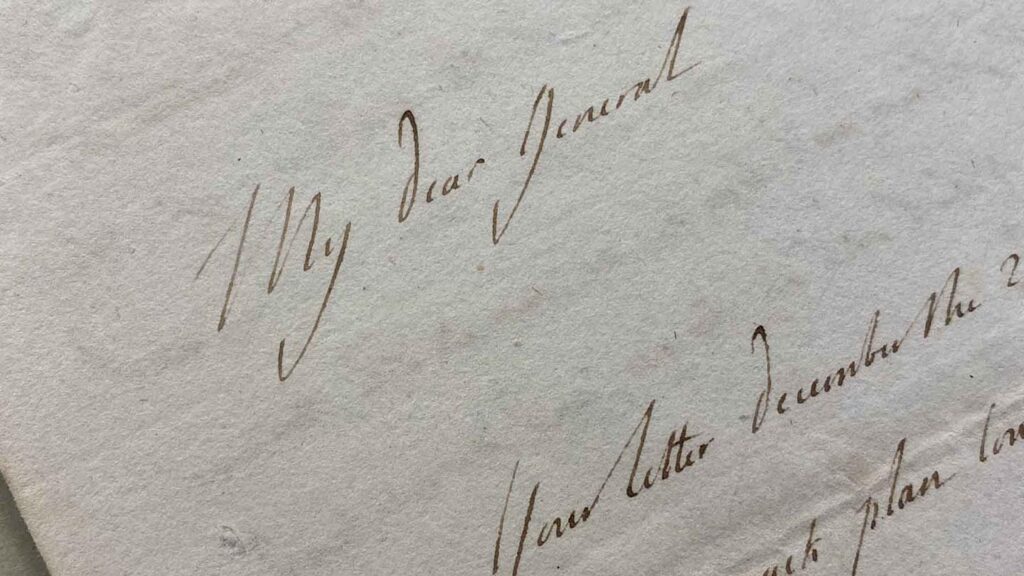
One of the many letters the Marquis de Lafayette sent to George Washington, which are preserved at Lafayette College.
By Bryan Hay
The Marquis de Lafayette corresponded with the first seven U.S. presidents, but he devoted most of his paper and ink to George Washington, who received hundreds of letters from his young protégé that today provide a real-time glimpse into early American history.
In its Special Collections, Lafayette College maintains the largest single repository of letters by Lafayette to Washington, from the earliest ones written from Valley Forge in 1777 to the 1790 letter by which Lafayette sends to Washington the key to the Bastille.
It’s one of the most important collections of high-level correspondence from early America, ranking alongside the John and Abigail Adams letters and the rich dialogue between Adams and Thomas Jefferson in their later years, says Thomas Lannon, Lafayette’s director of special collections and college archives.
With a look to Presidents Day, Lannon has reexamined the well-preserved letters written on thick, sturdy cotton rag parchment with penetrating iron gall ink, some of which include notes in Washington’s hand indicating how he would respond to Lafayette.

Thomas Lannon
Donated to the College in 1943 by Helen Fahnstock Hubbard of New York, all of the letters are written in English, with approximately half sent from military camps in America and half from France; 81 of them are docketed in Washington’s hand, usually on the reverse of the last sheet, with the note “From Marq. de la Fayette” and date of the letter.
The letters had been returned to Lafayette from Mount Vernon by Washington’s nephew, Bushrod Washington, in response to a request from Lafayette himself in 1811.
In his Dec. 15, 1811, letter to Bushrod Washington, Lafayette lamented the loss of his papers “in the revolutionary storms of Europe” and asked that his letters and copies of Gen. Washington’s letters be sent to him, Lannon says. These letters remained at Lafayette’s home outside Paris until after World War I, when they were sold to Hubbard.
Seven letters written during the Revolutionary War contain deciphering of Lafayette’s military code in Washington’s hand. Lafayette indicates locations of military forces using a coded numbering system, and Washington’s deciphering of the code appears above each number within the manuscripts.
“This was high ranking diplomatic correspondence wherein the fate of a fledgling nation unfolded,” Lannon says. “It was top secret correspondence as well.
“These letters between Lafayette and Washington, written primarily during the War for Independence, are valuable primary sources describing military strategies employed by the American and French forces against the British,” he says. “Lafayette wrote Washington, whom he considered a father figure, far more often than he wrote the other presidents.”
Compared to letters he wrote to other presidents and prominent figures of the time, the ones to Washington are more epistolary and reveal a deep respect, he says.
Lannon identified some of his favorite excerpts from the letters:
Dec. 30, 1777, Valley Forge
Notes: This is an early letter, the English is a bit broken, and stirring for its patriotism and zeal knowing where their friendship would lead.
Quote: “I don’t Need telling You How I am Sorry for all what Happens Since Some time it is a necessary dependence of my most tender and Respectful friendship for You, which affection is as true and Candid as the other Sentiments of my Heart and much Stronger than a So new acquaintance Seems to admit. But an other Reason to be Concerned in the present Circumstances is my Ardent, and perhaps enthusiastic wishes for the Happiness and liberty of this Country. I See plainly that America Can defend Herself if proper Measure are taken and Now I Begin to fear that She Could be lost By Herself and Her own Sons.”
Jan. 5, 1778, Valley Forge
Notes: This letter includes military advice from Lafayette to Washington. Lafayette made several military and organizational suggestions to Gen. Washington.
Quote: “do’nt you think, Sir, that if we have a very large army as I hope we schall, and I think we must absolutely, that a quarter master general with the rank of general officer with a considerable departement as in the european armys schould not be very useful – I pray it schould be a man who would have been in europe in the staff of big armies.” Gen. Washington docketed the letter.
Aug. 25, 1778, Camp Before Newport, R.I.
Notes: This is one of the longest letters in the collection. Lafayette hand wrote the seven-page letter four days before the Battle of Rhode Island. This missive discussed strategy for the upcoming fight and ongoing bad news about the progress of the war.
Quote: “let us consider, my dear general, the motions of that fleet since it was propos’d by the count d’estaing himself and granted by the king in behalf of the united states… the news of that fleet has occasion’d the evacuation of Philadelphia – its arrival has oppened all the harbours, secur’d all the coasts, oblig’d the British Navy to be together – six of those frigattes, two of them I have seen sufficient for terrifying all the trading people of the two Carolinas, are or taken or burnt-the Count d’estaing went to offer the battle and be a check to the british Navy for a long time at New York – it was agreed he schould go to Rhode Island an[d] there he went – At Newport, he goes out under the hottest fire of the british land batteries, he puts the british Navy to flight, pursues them, and they were all in his hands when that horrid storm arrives to Ruin all our hopes – both fleets are divided, scattered – the Cæsar a 74 guns schip is lost…Could you believe that forgetting any national obligation, forgetting what they were owing to that same fleet, what they were yet to expect from them, and instead of Resenting theyrs accidents as these of allies and brothers, the people turn’d mad at theyr departure, and wishing them all the evils in the world… as soon as the fleet will be Repair’d which (in case they are treated as one is in a country one is not in war with) schall be done in three weeks from this time, the count d’estaing was to come arround, the expedition seems to offer a very good prospect – if the ennemy evacuates New york, we have the whole Continental army… Reccommend to the several chief persons of boston to do any thing they Can to put the French fleet in situation of sailing soon…”. Gen. Washington docketed the letter.
“These letters have been safely preserved at the College for almost 100 years now,” Lannon says. “Each one is a window into how Lafayette planned strategy and shows the events of the American Revolution in real time. This material is incredibly important for the understanding of American history.”
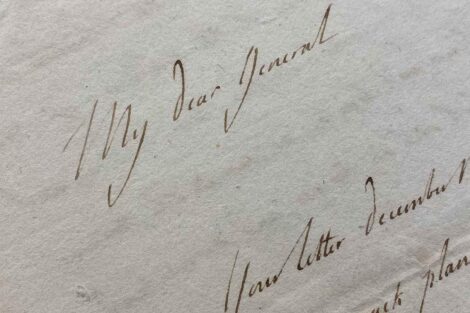
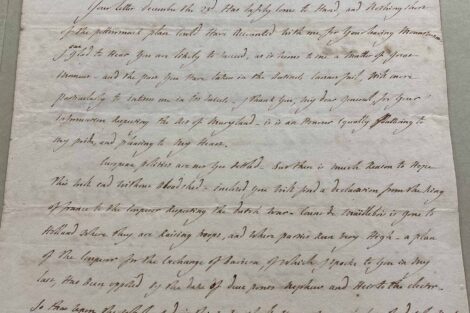
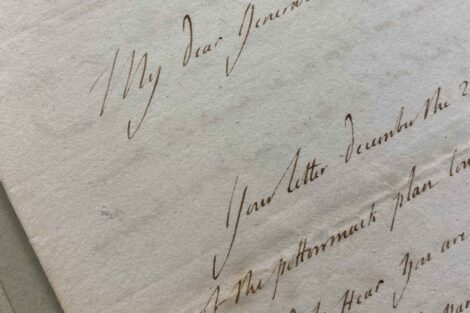
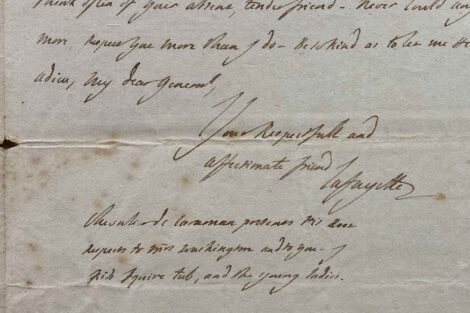
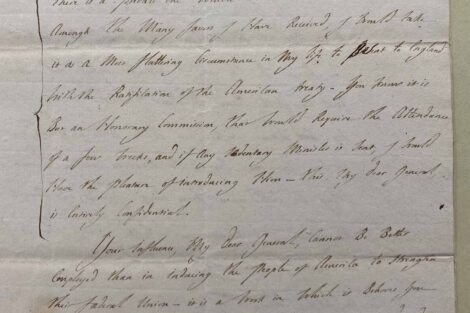
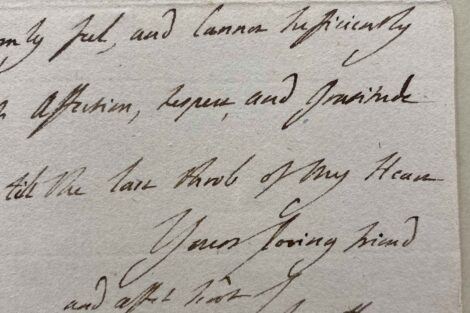
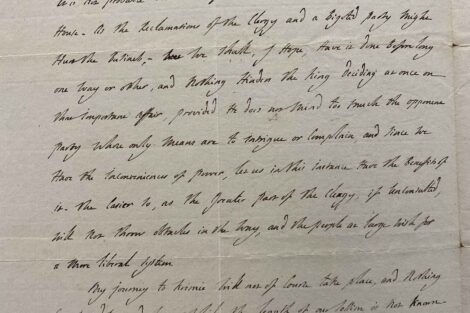
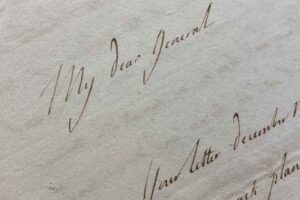
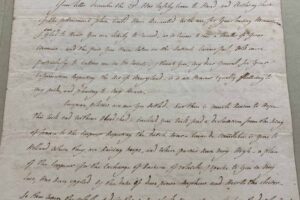
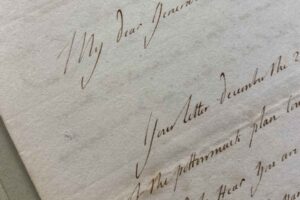
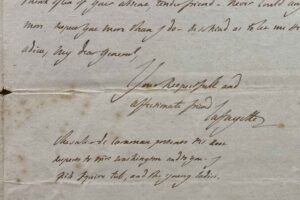
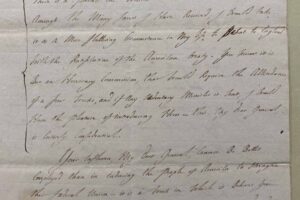
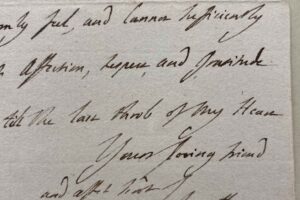
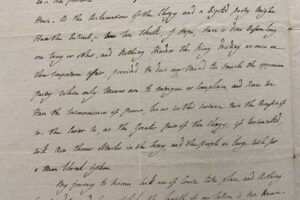

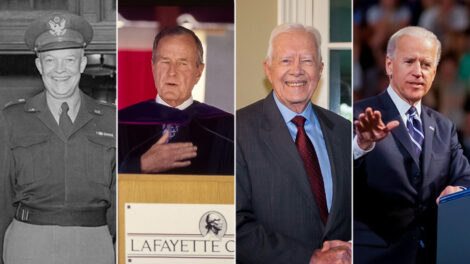
1 Comment
Thank you! I love reading about Lafayette – a truly virtuous man. I believe the college should do everything possible to link itself to him. I even made shirts with his crest for my son to wear – especially on campus. Not sure what significance a leopard has (they aren’t even found on this continent.
Anyway, Lafayette’s moral compass was always true and that is sorely missed in today’s era.
Just one man’s opinion.
Comments are closed.